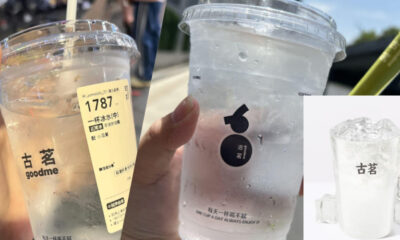China Arts & Entertainment
Chinese Shoppers Are Going Absolutely Crazy over UNIQLO x KAWS Collection
Everybody wants KAWS – Chinese shoppers were even spotted fighting in front of a UNIQLO store today.
Published
6 years agoon
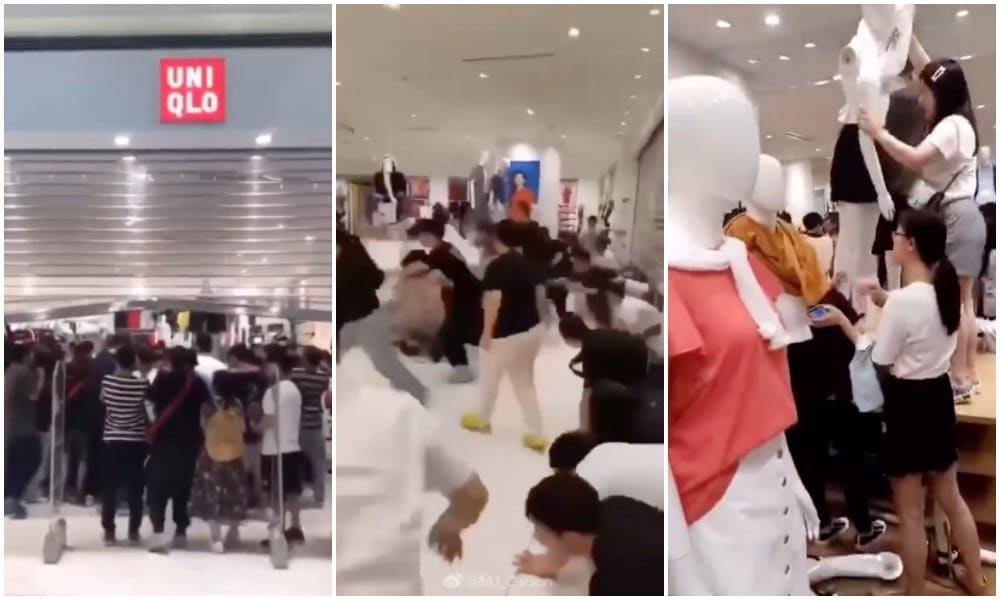
First published
The Chinese sales of the UNIQLO KAWS collection are so crazy that the craze itself has become an online hit. “I don’t even like UNIQLO, I just like to compete,” some shoppers say.
Chinese shoppers are going completely crazy over the latest collection sold by Japanese fashion company UNIQLO (优衣库) today. The summer collection is a cooperation between UNIQLO and the renowned American artist and designer KAWS (Brian Donnelly).

It is not the first time for the American street artist to partner with the Japanese chain: they previously also collaborated on a Sesame Street-themed collection.
The current collection first started selling in mainland China stores in the early morning of Monday, June 3, and soon became a top trending topic on social media.
The online sales reportedly were sold out in seconds.

Photos and videos circulating on Weibo show people fighting to get into UNIQLO stores, pulling clothes off the shop mannequins, and buying piles of clothes from the stores (see embedded tweet below):
Chinese shoppers are going absolutely crazy over UNIQLO x KAWS collection: https://t.co/DeC9xNgpOk pic.twitter.com/T01gYCAHXB
— Manya Koetse (@manyapan) 3 juni 2019
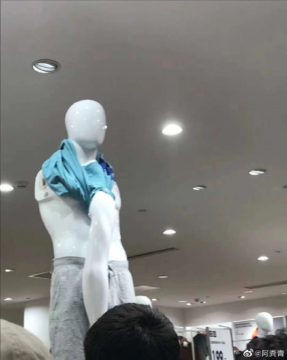
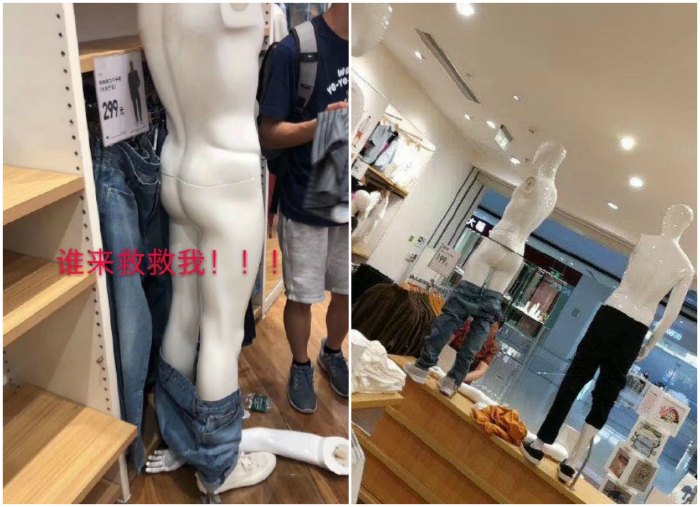
The hashtag “Everybody KAWS” (#全员kaws#) had received 140 million views on Weibo by Monday evening, China time.
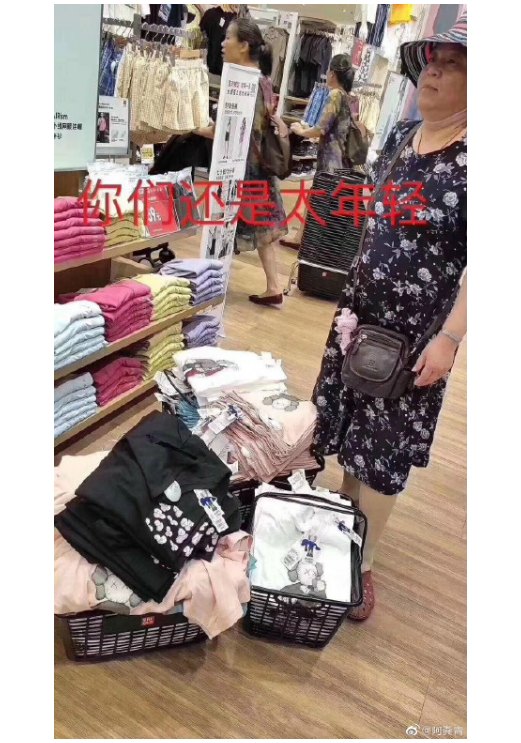
Many netizens on Weibo are confused about the big hype surrounding the latest UNIQLO selection, with some wondering who KAWS is, and why people are so eager to wear his design.

Some commenters joke that it actually is not really about the KAWS collection at all, but more about the competition between shoppers on who can score the most clothes from the special product line.
The topic has set off various memes and online jokes, with some people saying: “I don’t think there is any need to learn self-defense skills. I only need to wear UNIQLO KAWS clothes, and no one will dare to touch me. They will all know that I can not only fight very well but also run very fast!”
Some memes suggest that KAWS sales have been so successful that everybody on the street or at work will walk around in the same t-shirts this week.
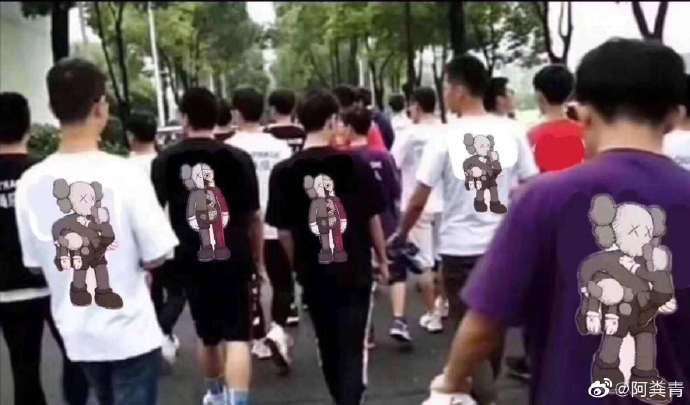
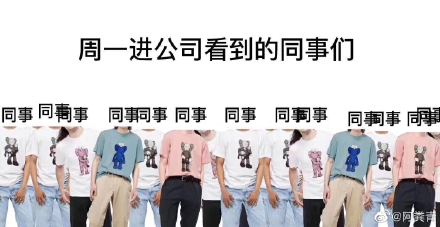
A meme that’s going viral saying: “Entering the office on Monday and seeing my colleagues…”
“I finally understand now,” one Weibo user writes: “What I love is not UNIQLO, nor KAWS – what I love is to rush and clash with all these people!”
The online sales of the UNIQLO x KAWS collection will start on June 6 in Europe. Its American sales started on Monday 10 AM ET.
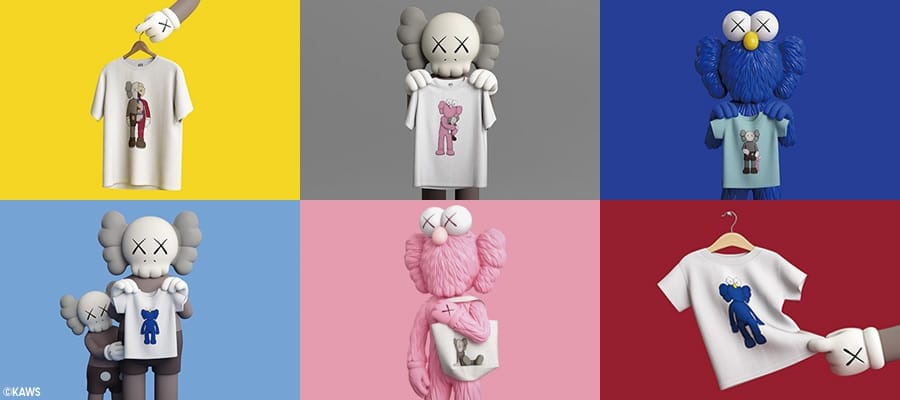
Meanwhile, in China, the T-shirts that were bought for RMB 99 ($14) today are being resold online for four-five times their original price.
This is not the first time the Japanese UNIQLO brand becomes a viral hit on Chinese social media, albeit for different reasons. In 2015, the brand became the talk of the week when a naked girl and a man recorded an adult video in the fitting room of their Beijing flag store.
Also read:
* Chinese Kid Destroys Lego Sculpture Within Hour After It Is Displayed
* Kidnappers? Crazy Fans? No, It’s Chinese Parents on Their Kids’ First Day at School
By Manya Koetse and Miranda Barnes
Follow @whatsonweibo
Spotted a mistake or want to add something? Please let us know in comments below or email us. Please note that your comment below will need to be manually approved if you’re a first-time poster here.
©2019 Whatsonweibo. All rights reserved. Do not reproduce our content without permission – you can contact us at info@whatsonweibo.com
Manya is the founder and editor-in-chief of What's on Weibo, offering independent analysis of social trends, online media, and digital culture in China for over a decade. Subscribe to gain access to content, including the Weibo Watch newsletter, which provides deeper insights into the China trends that matter. More about Manya at manyakoetse.com or follow on X.

China Celebs
Earring Gate: Huang Yangdiantian and the 2.3 Million RMB Emerald Earrings
Published
1 hour agoon
May 25, 2025By
Ruixin Zhang
Dear Reader,
This week, the Chinese internet exploded over a pair of earrings worn by a child actress.
In recent years, China’s netizens have been paying closer attention to so-called “nepo babies”—the children of the rich and powerful whose success often seems tied more to family connections than to talent.
Some, like Huawei’s heiress Yao Anna (姚安娜), have been criticized for using family ties to enter the entertainment industry. Others, like the infamous “Miss Dong” in the recent medical scandal, have sparked public outrage for abusing privilege to bend academic rules.
Facing economic difficulties and a tough job market, the public’s tolerance for nepotism and corruption is running increasingly thin. But when these issues touch on national trauma, including natural disasters and charity efforts, the public anger runs even deeper.
That’s why a Chinese teenage actress named Huang Yangdiantian (黄杨钿甜) recently found herself at the center of an online storm.
Earring Gate: Behind the Sparkle
Huang, born in 2007, started her career as a child actress in the 2017 historical drama Princess Agents (楚乔传).

She later gained more popularity by starring in other hit series, including Ruyi’s Royal Love in the Palace (如懿传), and also built an online following.
The recent scandal broke out after Huang shared a series of photos on Xiaohongshu, where she has around 328,000 followers. In the photos, meant to celebrate her 18th birthday, she’s seen proudly wearing a pair of sparkly emerald earrings. In the caption, she mentioned they belonged to her mom.
Sharp-eyed netizens quickly identified the earrings as a pair from the British luxury brand Graff—worth a jaw-dropping 2.3 million RMB (319,000 USD).

Digging deeper, online sleuths also found a Weibo post from 2018 showing Huang’s mother wearing a Cartier bracelet, which now retails for around 450,000 RMB (62,400 USD).
Considering Huang’s limited acting experience and modest earnings as a child actress, these luxury items raised eyebrows—and questions about where the family’s wealth was really coming from.
The “online detectives” didn’t stop there. They discovered that Huang’s father, Yang Wei (杨伟), was once a public official in Ya’an City (雅安市), Sichuan Province. After a major 7.0-magnitude earthquake struck Yan’an in 2013 (the Lushan Earthquake), Yang was reportedly involved in post-earthquake reconstruction projects, including investment and tendering.
Interestingly, in 2014, just a year after the earthquake, Huang’s family registered a film and culture company in Shenzhen with 5 million RMB (694,000 USD) in capital. Initially, the company’s legal representative was Huang’s uncle, followed by her mother in 2016. But after Yang resigned from public service, he took over as the official legal representative.
During the pandemic in 2020, Yang also registered a biotech company, which was later rebranded as a beauty and cosmetics trading business. The timing—one company during post-quake reconstruction, then another during a global health crisis—raised suspicions about whether Yang was using national emergencies as business opportunities.
It was also discovered that the Yang family currently lives in a luxury villa in one of Shenzhen’s most upscale neighborhoods, valued at over 100 million RMB (approximately 13.8 million USD).
How did Yang get enough money to start such companies and purchase a multi-million yuan villa? Even if all his official work and business ventures were legitimate, netizens pointed out it still wasn’t enough to explain the family’s enormous wealth.
Huang’s Father Responds, Netizens Dig Deeper
As the controversy grew, Huang’s father responded on May 16 via Weibo, using an account simply named “Huang Yang’s Dad” (黄杨爸爸).
In his post, he claimed that the emerald earrings were fake and of little value. He acknowledged having worked for the Yan’an government but denied any involvement in post-earthquake work, saying the online accusations against him were a case of mistaken identity—“just someone with the same name.” He even added, “I’ve never been corrupt—feel free to report me.”
But the “same name” defense didn’t hold up for long.
In a second wave of ‘detective work’ by online sleuths, netizens found a phone number listed under the name “Yang Wei” on a government website related to post-earthquake reconstruction projects in Ya’an. Some tried sending a small transfer to this number via Alipay, revealing that the profile picture linked to that account was a photo of Huang and her mother when she was younger, immediately making his “same name” explanation completely implausible.
Soon after, the account could no longer be found on Alipay, but because the number was likely tied to many services and platforms, it wasn’t easy to erase entirely. People quickly traced the same phone number to Yang’s accounts on other platforms. Around the same time, the legal representatives of the family’s companies were abruptly changed, only further fueling public suspicion.
Huang’s talent agency issued a statement calling the online rumors false but didn’t offer any concrete evidence to back that up.
By now, a local investigation by the Ya’an Discipline Inspection Commission has confirmed that Yang engaged in illegal business activities and that the birth of his second child (Huang’s younger brother) violated the one-child policy still in effect during his time as a government official. However, the investigation also denied any misappropriation of post-earthquake reconstruction funds. (link).
Most netizens find that many key questions are still left unanswered, and continue to investigate and dissect every single detail relating to Yang, Huang, and the earrings.
More than Online Gossip: Privilege & Public Grief
Some argue that the online speculation surrounding this case has now gone too far.
But for many Chinese netizens, especially younger ones, this isn’t just another scandal passively consumed by the so-called “melon-eating masses” (吃瓜群众). It strikes a nerve because it brings together several sensitive issues all at once.
Although China’s “nepotism babies” frequently spark backlash, they’re also everywhere, from business and entertainment to political and academic circles. For years, the fù èr dài (富二代), or “second-generation rich”—children of those who built fortunes after China’s economic reforms in 1978—have drawn criticism for flaunting wealth and behaving irresponsibly.
Through the years, new terms have been added to China’s nepotism lexicon: there’s xīng èr dài (星二代), referring to the children of celebrities; guān èr dài (官二代), a negative label for the children of government officials or bureaucrats; and hóng èr dài (红二代) and jūn èr dài (军二代), used to describe the children of political elites and military families.
Nepotism is closely tied to corruption—another painful issue in society that surfaces time and again. It’s particularly sensitive because it undermines more than just trust in (local) leadership; it erodes faith in meritocracy and leads the public to question the fairness of the entire system.
When these kinds of issues become entwined with national disasters and charity work—where the already privileged are seen to illegally profit from public grief for private gain—it becomes more than just a breach of public trust. It crosses a moral red line in the most extreme way.
For many young Chinese today, earthquake disasters are not distant history – they’re part of a shared collective memory that still strikes a nerve. In the comment sections of related news posts these days, many netizens recall donating money and supplies to earthquake relief efforts, now wondering whether their goodwill ever truly reached those in need.
The timing has only added fuel to the fire. The controversy erupted around the 17th anniversary of the devastating 2008 Wenchuan earthquake (5.12). Though that disaster is different from the 2013 earthquake, both struck Ya’an City, and public discussions has started to lump them together, bringing back old memories and concerns about disaster relief and public trust.
Back in 2009, Professor Deng Guosheng (邓国胜) from Tsinghua University studied where the 76.7 billion RMB (about 10.5 billion USD) in Wenchuan relief donations had gone. He found that nearly 80% of the money was controlled by the government or groups linked to it, like the Red Cross, with little transparency on how it was spent. People basically have no idea how the money they donated was spent.
In light of the recent controversy, Deng’s study and its numbers are being brought up again in many threads across Chinese social media. Today, as much as 15 years ago, the call for transparancy on how the public’s money is being used in the post-disaster time period is just as relevant.
One Weibo commenter wrote: “For context, in all of 2024, Ya’an City’s general public budget revenue was 8.4 billion RMB in total. This means that the total amount of donations and supplies after the 2008 earthquake was equivalent to 25 years of Ya’an’s current public budget revenue!” He later added: “It’s really not unreasonable at all for the public to ask questions about the authenticity of a pair of 2.3 million RMB earrings.”
Others agree: “It’s absolutely valid for everyone to focus on whether Huang Yangdiantian’s father was involved in embezzlement or bribery (..) When it comes to a tragic event like the Wenchuan earthquake, claims should especially be backed by solid evidence.”
The speculation about Huang’s family wealth goes well beyond celebrity gossip or a “nepo baby” narrative; it reflects a deeper call for clean governance and stricter oversight of how public and charitable funds are managed and spent.
As for Huang, the consequences of her glamorous photoshoot and the controversy it sparked are already unfolding. While her father has now become the target of further formal investigation by disciplinary authorities, it’s rumored that Huang has been removed as the female lead for the historical drama Peacock Bone (雀骨), as well as casting uncertainty over the viability of some of her upcoming projects.
At least we almost certainly know one thing: she won’t be wearing those earrings again any time soon.
Best,
Ruixin Zhang & Manya Koetse
China History
A Love Never Lost: The Historical Drama That Took Five Years (and a Run-In with Censors) to Finally Air
Published
4 days agoon
May 21, 2025
The Chinese historical drama A Love Never Lost (人生若如初见) has been getting a lot of attention on Chinese social media since it made its surprise premiere on iQiyi on May 13.
By now, one of the main hashtags about the drama on Weibo has already exceeded 2.2 billion views. Meanwhile, large billboards featuring posters from the show have appeared from Chongqing to Beijing.
To say that A Love Never Lost has been a much-anticipated drama is somewhat of an understatement. The drama, directed by Wang Wei (王伟) and written by the acclaimed Jiang Qitao (江奇涛), was already filmed in 2020 and was actually set to air in July of 2022. Fans have been waiting for five years to watch the major production with its powerhouse cast.

On the day of its originally scheduled premiere in 2022, July 18, Hunan TV unexpectedly aired Minning Town (山海情) instead — a drama about Ningxia villagers lifting themselves out of poverty by building a new settlement on the edge of the Gobi Desert. Closely aligned with the Party’s poverty alleviation goals, it was apparently seen as a safer bet for broadcast.
What caused A Love Never Lost to be removed from the schedule just two hours before its planned airing? Although no official reason was ever given for the cancellation, it was rumored that the show suddenly got a red light and needed last-minute regulatory reviews.
According to the Dian & Ying blog (电和影) at the time, the historical drama likely still faced “approval problems” (审核问题) — possibly due to the sensitive nature of the historical events it depicts.
The series is set in the late Qing dynasty, in the aftermath of the Boxer Rebellion (1899–1900) — a violent anti-foreign, anti-Christian uprising that took place during the final years of the Qing Dynasty and led to large-scale massacres of Christians and foreign residents in China. The rebellion officially ended in 1901 with the signing of the Boxer Protocol (辛丑条约), generally seen as a “treaty of humiliation” (“辱国条约”). In the wake of these events, China — weakened and with several major cities under foreign occupation — entered a period of economic hardship and political instability.

TV drama posters featuring Liang Xiang, Yang Kaizhi, and Li Renjun.
A Love Never Lost follows the story of Chinese youth Liang Xiang (梁乡, played by Li Xian 李现), a descendant of the Qing imperial family; Yang Kaizhi (杨凯之, by Wei Daxuan 魏大勋), a revolutionary from a humble background; and Li Renjun (李任军 by Zhou You 周游), a member of the Beiyang Right Guard Army — three young men who are among the first Chinese students to study at a military academy in Japan, where they end up sharing a dorm.
On their journey there, they meet Wu Tianbai (吴天白 – Zhu Yilong 朱一龙) and Xie Shuhong (谢菽红 – Jessie Li 春夏), the determined daughter of a wealthy publishing family from Anhui.

Main protagonists of A Love Never Lost.
The lives of these five — who were, quite literally, on the same boat — begin to intertwine from that moment on, their personal journeys becoming inseparable from the fate of the Chinese nation during a turbulent chapter at the end of imperial rule.
For this drama, which explores a historical turning point through personal stories, the production team consulted late Qing historian Jia Yinghua (贾英华).
On Chinese social media, the series is praised as a strong drama with compelling characters full of emotional depth, even though they may not all be likeable – Liang Xiang, whose character represents the late Qing aristocracy, acts entitled and smiles after he forces himself onto Xie Shuhong.
On Xiaohongshu, the role of women in the series is especially discussed. Besides forced marriage customs in the late Qing, the role of Xie Shuhong is seen as one where the woman – and the way she is treated by the men around her – is also a metaphor for the decline and rise of the Chinese nation. Many viewers feel frustrated with just how powerless women were in those days.
Beyond the characters and the history they reflect, the show’s costumes, set design, and attention to historical details have also earned praise from viewers.
Despite its positive reception, the censorship that followed its canceled 2022 premiere is also a recurring topic of discussion. A significant number of scenes or moments have allegedly been cut, though it remains unclear whether this was due to historical sensitivities or intimacy-related content. Netizens feel some scenes don’t make sense, or that the development of certain characters, like Wu Tianbai, is confusing or incoherent due to the cuts that were made.
Many also question why some seemingly minor adjustments were made, and mourn the loss of what appears to be a substantial amount of original footage.
“It’s painful to see a project into which so many people poured their good faith, wisdom, sweat, and even money, end up being shown to the public in such a fragmented way,” one fan wrote on Weibo.
You can watch the series on iQiyi or YouTube (afaik no English subtitles yet).
By Manya Koetse
(follow on X, LinkedIn, or Instagram)
Spotted a mistake or want to add something? Please let us know in comments below or email us. First-time commenters, please be patient – we will have to manually approve your comment before it appears.
©2025 Whatsonweibo. All rights reserved. Do not reproduce our content without permission – you can contact us at info@whatsonweibo.com.
Subscribe

Earring Gate: Huang Yangdiantian and the 2.3 Million RMB Emerald Earrings

Guming’s 1 Yuan Ice Water: China’s Coolest Summer Trend

A Love Never Lost: The Historical Drama That Took Five Years (and a Run-In with Censors) to Finally Air

Wahaha and Jinmailang: the Bottled Water OEM Controversy

Behind the Mysterious Death of Chinese Internet Celebrity Cat Wukong

Beyond the Box Office: What’s Behind Ne Zha 2’s Success?

IShowSpeed in China: Streaming China’s Stories Well

China Is Not Censoring Its Social Media to Please the West

China Reacts: 3 Trending Hashtags Shaping the Tariff War Narrative

Chinese New Nickname for Trump Mixes Fairy Tales with Tariff War

US-Russia Rapprochement and “Saint Zelensky”: Chinese Online Reactions to Trump’s Shake-Up

China Trending Week 15/16: Gu Ming Viral Collab, Maozi & Meigui Fallout, Datong Post-Engagement Rape Case

Squat or Sit? China’s Great Toilet Debate and the Problem of Footprints on the Seat

Strange Encounter During IShowSpeed’s Chengdu Livestream

How Ne Zha 2’s Shen Gongbao Became Known as the Ultimate “Small-Town Swot”
Get in touch
Would you like to become a contributor, or do you have any tips or suggestions? Get in touch here!
Popular Reads
-

 China Digital12 months ago
China Digital12 months agoChina’s 2024 Gaokao Triggers Online Discussions on AI
-

 China Media11 months ago
China Media11 months agoA Triumph for “Comrade Trump”: Chinese Social Media Reactions to Trump Rally Shooting
-

 China Society8 months ago
China Society8 months agoDeath of Chinese Female Motorcycle Influencer ‘Shigao ProMax’ Sparks Debate on Risky Rides for Online Attention
-

 China Memes & Viral11 months ago
China Memes & Viral11 months agoThe “City bu City” (City不City) Meme Takes Chinese Internet by Storm


